|
Any idea what this is
|
|
| miked |
Posted on 20-10-2006 09:40
|
|
Member Location: Posts: 70 Joined: 20.10.06 |
Not even sure its a diptera. I found it on the floor after taking photos of oak leaves (from milton keynes, uk) and acorns from the new forest, uk. So there are two possible locations where it could have got in among the foliage. It was taken last evening 20 oct 2006. the size was about 1cm. actually when i did a preview there was no image shown even though the two images are 50k .jpg so appear to be well within the size limits Edited by miked on 20-10-2006 13:47 |
|
|
|
| miked |
Posted on 20-10-2006 09:46
|
|
Member Location: Posts: 70 Joined: 20.10.06 |
http://www.flickr.com/photos/37643313@N00/274472074/ http://www.flickr.com/photos/37643313@N00/274472073/in/photostream/ so here are those two missing images on flickr instead Edited by miked on 20-10-2006 13:48 |
|
|
|
| Gerard Pennards |
Posted on 20-10-2006 10:29
|
|
Member Location: Posts: 1914 Joined: 07.06.04 |
Yes, a dfiptera larva indeed. In fact, it is the larva of a syrphid, so family Syrphidae. Maybe I can even put a name on it, but that has to wait until I'm at home. Greetings, Gerard Greetings, Gerard Pennards |
|
|
|
| Paul Beuk |
Posted on 20-10-2006 11:19
|
|
Super Administrator Location: Posts: 19208 Joined: 11.05.04 |
Mike, attached images will not be visible in a preview (see FAQ) so if you wanted to attach images, you can still add them to your first message when you edit it.
Paul - - - - Paul Beuk on https://diptera.info |
|
|
|
| Guenter |
Posted on 20-10-2006 18:53
|
|
Member Location: Posts: 249 Joined: 09.12.05 |
Hello everybody. Yesterday a friend from the local museum of natural history www.inatura.at asked me if I could help him identify a larva which I thought to be a syrphid. With the (old and for sure incomplete) key I have I come up to Pipiza or Heringia which I don't really believe. 1. The length of the larvae is 13mm (without stigmata-"horn" which has another 1mm length). 2. The larvae have been found inside houses in three cities/villages around here (Dornbirn, Feldkirch and Egg, all in Vorarlberg/Western Austria) during the last week: Some in a guestroom which is not used very often, some in the corner of a room on the floor with mice's feces around and some "falling from the ceiling" according to the people who brought the larva to the inatura. I'd appreciate information on the species or genus and about what they were doing inside the rooms, as the people here have asked for this kind of info. I think it's the same species as in the pictures above Thanks in advance Here is a photo of dorsal and ventral view (Photos by Klaus Zimmermann) Edited by Guenter on 20-10-2006 19:23 Günter Schwendinger |
|
|
|
| Guenter |
Posted on 20-10-2006 18:54
|
|
Member Location: Posts: 249 Joined: 09.12.05 |
And a photo of the lateral view:
Edited by Guenter on 20-10-2006 18:54 Günter Schwendinger |
|
|
|
| Tony Irwin |
Posted on 20-10-2006 19:36
|
|
Member Location: Posts: 7168 Joined: 19.11.04 |
These are all Volucella inanis (Syrphidae), a predator of wasp larvae. As this species becomes more common in Britain, there are more and more frequent reports of these larvae from houses (all of which have wasp nests) - one was brought to me at the museum this morning! They are associated with Vespula vulgaris, V. germanica and Vespa crabro. Unlike other Volucella larvae, which scavenge in nests, these actually attack and eat the wasp larvae. (Nothing to do with oak leaves or acorns, Mike!)
Edited by Tony Irwin on 20-10-2006 19:39 Tony ---------- Tony Irwin |
|
|
|
| Guenter |
Posted on 21-10-2006 19:05
|
|
Member Location: Posts: 249 Joined: 09.12.05 |
Thank you Tony  , I've just got the same answer from the syrphidae mailing list (Martin Speight and Santos Rojo). , I've just got the same answer from the syrphidae mailing list (Martin Speight and Santos Rojo).
Günter Schwendinger |
|
|
|
| Jump to Forum: |


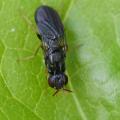



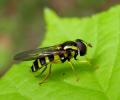
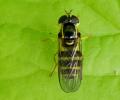

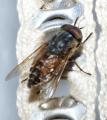
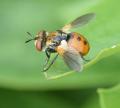



 but don't see the image in the post.
but don't see the image in the post.